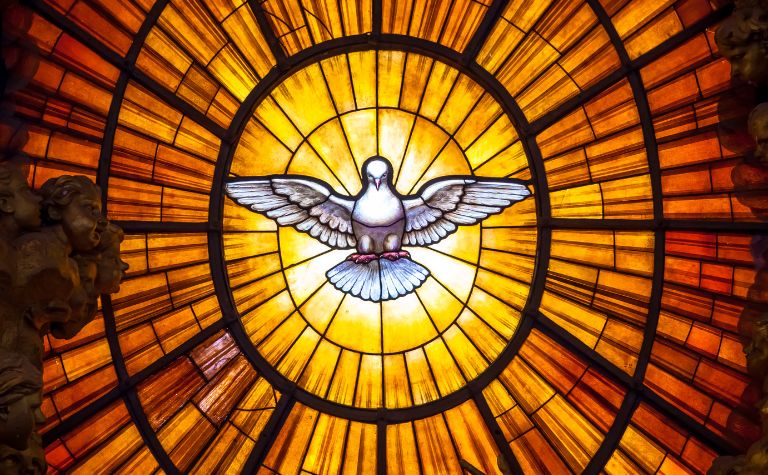The Holy Spirit is the same person in the Old and New Testaments. His nature and attributes didn’t change from the time he hovered over the waters before creation (Gen. 1:2) to when he rested on Jesus after his baptism (Matt. 3:16) to when he filled the early church on the day of Pentecost (Acts 2:4). Yet the Spirit’s work, and the result of it in people’s lives, intensified under the New Covenant. But how?
Christians experience God under the New Covenant primarily through the Holy Spirit. The Law, under the Old Covenant, though important, was limited and left people in bondage to sin. Under the New Covenant, which Jesus Christ’s death inaugurated, the Spirit produces freedom in the lives of believers.
How does Paul relate the freedom the Holy Spirit produces to the veil Moses wore? In 2 Corinthians 3:17, what does “the Lord is the Spirit” mean? What does “the Spirit of the Lord” mean? What is the nature of the freedom that Paul describes? Keep reading to learn the answers to these questions and others.
Also see What Does the Holy Spirit Do? to learn more.

How does Paul relate the Spirit, freedom, and Moses’ veil?
2 Corinthians 3:17 reads, “Now the Lord is the Spirit, and where the Spirit of the Lord is, there is freedom” (ESV). Every major English Bible translation (NIV, NASB, KJV, NKJV, NLT) renders the phrases “the Lord is Spirit” and “the Spirit of the Lord” the same way. However, some translations render the last word “freedom” (NIV, NLT, NASB), while others use the word “liberty” (KJV, NKJV).
2 Corinthians 3:17 is found in a section of the letter in which Paul is writing about his God-given ministry (2:12-6:10). Chapter 3 is about being ministers of the New Covenant that Jesus Christ inaugurated (cf. Luke 22:20). Paul writes, “Our sufficiency is from God, who has made us sufficient to be ministers of a new covenant, not of the letter but of the Spirit. For the letter kills, but the Spirit gives life” (3:5b-6, ESV).
The covering of the veil limits people’s understanding
Bible scholars teach the background of 2 Corinthians 3:12-18 is the story recorded in Exodus when Moses covered his face after giving God’s law to the Israelites. He did because its radiance was so powerful after engaging with God. “The people of Israel would see the face of Moses, that the skin of Moses’ face was shining. And Moses would put the veil over his face again, until he went in to speak with him” (Exod. 34:35).
Paul’s analogy is that a veil obstructs the view of those still living under the Old Covenant law. Paul writes, “But their minds were hardened. For to this day, when they read the old covenant, that same veil remains unlifted, because only through Christ is it taken away. Yes, to this day whenever Moses is read a veil lies over their hearts.” (3:14-15). The veil leaves people blind and in bondage and slavery.
The lifting of the veil allows people to see
Paul continues the analogy to say that have responded to the gospel of Jesus Christ can “see” what the veil obstructed because of the Holy Spirit’s work in their lives. “But when one turns to the Lord, the veil is removed. Now the Lord is the Spirit, and where the Spirit of the Lord is, there is freedom” (3:16-17). But what do Paul’s references to the Spirit mean? What is the freedom he mentions?
Also see What Is a Familiar Spirit? to learn more.

What Does “The Lord Is the Spirit” Mean?
The New Covenant signaled a new day for the Holy Spirit’s ministry in the world. While the third person of the Trinity had the same nature and attributes under the New Covenant, the degree of his activity increased. Jesus said that after he ascended into heaven, he would send a “Helper” (ESV), “Advocate” (NIV), or “Counselor” (KJV) to his people. That helper is the Holy Spirit (cf. Acts 1:8).
| Greek: Ὁ δὲ Κύριος τὸ Πνεῦμά ἐστιν |
| Transliteration: Ho de Kyrios to Pneuma estin |
| NASB: “the Lord is the Spirit” |
Believers today primarily experience God through the Holy Spirit. Paul isn’t saying that the Holy Spirit and the Lord, Jesus Christ, are the same person. One 2 Corinthians scholar, Colin Kruse, explains it this way: “The expression the Lord is the Spirit is not a one-to-one identification, but rather a way of saying that under the new covenant we experience the Lord as the Holy Spirit.” [1]
What does the Spirit of the Lord Mean?
The first phrase, “the Lord is the Spirit,” describes how people experience God under the New Covenant. The second phrase, “where the Spirit of the Lord is,” explains one result of a Christian’s experience with God under the New Covenant. In summary, Christians primarily experience God through the Holy Spirit, and one result of their experience is freedom.
| Greek: οὗ δὲ τὸ Πνεῦμα Κυρίου |
| Transliteration: hou de to Pneuma Kyriou |
| NASB: where the Spirit of the Lord is |
2 Corinthians 3:17 is the only occurrence of the phrase “the Spirit of the Lord” in Paul’s letters. However, the phrase appears 22 times in the Greek translation of the Old Testament, the Septuagint, that Paul used. In the Septuagint, the term refers to the Father, not Jesus, his son. Scholars debate over whether the “Lord” in 2 Corinthians 3:17 refers to the Father or the Son.
Also see What Does It Mean to Worship In Spirit and Truth? to learn more.

What is the freedom that Paul mentions?
Most scholars believe that the freedom Paul describes is the result of discarding the Old Covenant for the New Covenant. Under the Old, the law resulted in bondage. Under the New, the Spirit generates freedom.
| Greek word | ἐλευθερία |
| Part of speech | noun |
| Transliteration | eleutheria |
| Pronunciation | elyoothereeah |
| Definition | a state of freedom from slavery |
Many scholars believe that Paul is describing the same reality in Galatians 3:23-25 where the imagery of bondage and freedom is even more apparent.
Galatians 3:23-25 reads, “Now before faith came, we were held captive under the law, imprisoned until the coming faith would be revealed. So then, the law was our guardian until Christ came, in order that we might be justified by faith. But now that faith has come, we are no longer under a guardian” (ESV).
Paul states the truth even more clearly in Galatians 5:1, “For freedom Christ has set us free; stand firm therefore, and do not submit again to a yoke of slavery” (ESV).
Christians have unveiled faces
Paul concludes the passage, writing, “And we all, with unveiled face, beholding the glory of the Lord, are being transformed into the same image from one degree of glory to another. For this comes from the Lord who is the Spirit” (2 Cor. 3:18, ESV).
2 Corinthians scholar, George Guthrie, writes, “It is when a person turns to the Lord, opening their lives to the Holy Spirit, that the veil over the heart is removed in Christ (3:16-17). People transformed by the experience of God’s glory in the gospel then can experience the ongoing transformation of God’s Spirit as they live in the presence of God” (3:18). [2]
Also see What Are the 7 Gifts of the Holy Spirit? to learn more.
References:
[1] 2 Corinthians by Colin Kruse. TNTC. p. 135.
[2] 2 Corinthians by George Guthrie. BECNT. p. 230.
Related Questions
The possibility of blaspheming the Holy Spirit frightens many Christians because Jesus referred to it as unforgivable. The idea that there is a transgression that God's grace and mercy don't apply...
The third member of the Trinity, the Holy Spirit, in cooperation with the Father and the Son, Jesus Christ, does important work in people's lives. Yet there is a mystery to the Spirit's ministry...
